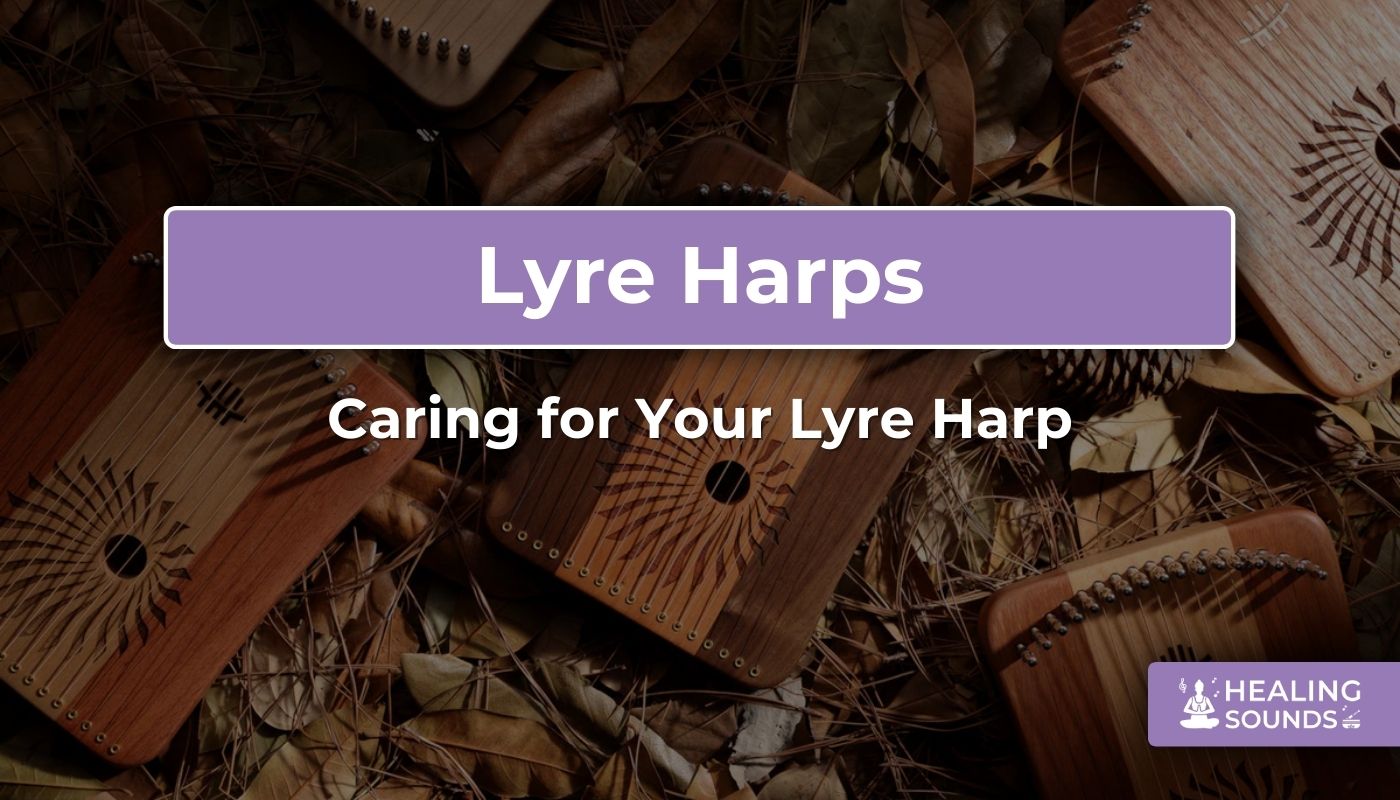Mit der Anschaffung einer Leierharfe schließen Sie ein wunderschönes Instrument in Ihr Leben, das beruhigende Melodien und einen Hauch uralter Magie mit sich bringt. Doch wie bei jedem wertvollen Besitz ist die richtige Pflege Ihrer Leierharfe entscheidend, um ihren bezaubernden Klang zu bewahren und ihre Langlebigkeit zu gewährleisten. Egal, ob Sie die Leier erst seit Kurzem spielen oder schon seit Jahren, das Verständnis für die Pflege einer Leierharfe ist unerlässlich. Dieser Leitfaden zeigt Ihnen effektive Methoden, um Ihr Instrument in Topform zu halten und sowohl seine Schönheit als auch seinen vollen Klang zu bewahren.
Warum die Wartung einer Leierharfe so wichtig ist
Die richtige Pflege Ihrer Leierharfe geht über die reine Instandhaltung hinaus; sie wirkt sich direkt auf die Leistung und Lebensdauer des Instruments aus. Jedes Bauteil, von den Saiten und Stimmwirbeln bis zum Holzkorpus, trägt zu seiner einzigartigen Klangqualität bei. Vernachlässigung der regelmäßigen Pflege kann zu dumpfen Klängen, Schäden oder kostspieligen Reparaturen führen und so die wohltuenden Klänge und das entspannende Erlebnis Ihrer Leier mindern.
Regelmäßige Pflege schützt Ihr Instrument vor häufigen Problemen, die durch Umwelteinflüsse, Staubansammlungen und regelmäßige Nutzung entstehen. Mit einfachen Pflegeroutinen stellen Sie sicher, dass Ihre Leier auch in den kommenden Jahren klare, harmonische Töne erzeugt und ihren Wert als Musikinstrument und Quelle der Ruhe steigert.
Die Bedürfnisse Ihrer Leierharfe verstehen
Bevor wir uns mit der Wartung befassen, ist es hilfreich, den Aufbau Ihrer Leierharfe zu verstehen. Leierharfen bestehen typischerweise aus einem Holzkorpus (Resonanzkörper), einem Querbalken, Stimmwirbeln und Saiten aus Nylon, Darm oder Metall. Die Holzart – wie Ahorn, Palisander oder Mahagoni – beeinflusst die Resonanz des Instruments und seine Empfindlichkeit gegenüber Umweltveränderungen.
Wenn Sie diese Komponenten kennen, verstehen Sie, warum bestimmte Pflegemaßnahmen wie die Kontrolle der Luftfeuchtigkeit oder die Überprüfung der Saiten so wichtig sind. Instrumente aus hochwertigen Materialien , wie sie Healing Sounds anbietet, sind oft langlebiger, benötigen aber dennoch sorgfältige Pflege, um optimale Leistung zu erbringen.
Grundlegende tägliche und wöchentliche Pflegeroutine
Durch die Integration einfacher Gewohnheiten in Ihren Alltag wird die Pflege Ihrer Leierharfe mühelos und effektiv.
Richtige Handhabung und Haltung
Fassen Sie Ihre Leierharfe immer mit sauberen Händen an, um Öl und Schmutz von Saiten und Holz fernzuhalten. Halten Sie die Leier beim Spielen sicher, aber sanft. Normalerweise liegt sie auf Ihrem Schoß oder am Körper, sodass Sie mit beiden Händen die Saiten zupfen können. Vermeiden Sie es, sie zu fest zu greifen oder Druck auf empfindliche Teile auszuüben.
Reinigen und Abstauben Ihrer Leier
Staub und Schmutz können sich auf Ihrer Leier ansammeln, was ihren Klang dämpfen und mit der Zeit die Oberfläche beschädigen kann. Wischen Sie die Holzoberflächen und Saiten nach jedem Gebrauch oder mindestens wöchentlich vorsichtig mit einem weichen, trockenen und fusselfreien Mikrofasertuch ab. Für tiefere Stellen im Bereich der Stimmwirbel kann eine weiche Bürste hilfreich sein. Verwenden Sie niemals Wasser, Möbelpolitur oder aggressive chemische Reinigungsmittel.
Saiten prüfen und stimmen
Die Saiten Ihrer Leierharfe sind entscheidend für ihren Klang. Überprüfen Sie die Saiten vor jedem Spiel visuell auf Anzeichen von Ausfransung oder Abnutzung. Stellen Sie vor allem sicher, dass Ihre Leier gestimmt ist. Temperatur- und Feuchtigkeitsschwankungen sowie regelmäßiges Spielen können dazu führen, dass die Saiten verstimmen. Die Verwendung eines chromatischen Stimmgeräts (entweder ein physisches Gerät oder eine Smartphone-App) hilft, die Tonhöhe genau zu halten.
Ja, Leiern müssen regelmäßig gestimmt werden , oft vor jeder Übung, insbesondere wenn sie neu sind oder nach dem Saitenwechsel, da sie Zeit brauchen, um sich einzuspielen. Das Stimmen stellt sicher, dass das Instrument die harmonischen, heilenden Klänge erzeugt, für die es bekannt ist.

16-saitiges Lyraharfeninstrument für Anfänger
$69.90 $90.90
Diese 16-saitige Leier ist ideal für Anfänger, da sie leicht zu handhaben und zu pflegen ist, sodass das Erlernen der Pflege einer Leierharfe ganz einfach ist.
Entdecken Sie diese Anfänger-LeierUmgang mit Umweltfaktoren
Holz reagiert empfindlich auf Veränderungen in seiner Umgebung, weshalb die Klimakontrolle ein kritischer Aspekt bei der Pflege einer Leierharfe ist.
Temperatur- und Feuchtigkeitskontrolle
Extreme oder schwankende Temperaturen und Luftfeuchtigkeit sind die Hauptfeinde von Holzinstrumenten wie der Leierharfe. Hohe Luftfeuchtigkeit kann das Holz aufquellen lassen, während niedrige Luftfeuchtigkeit es schrumpfen und reißen lassen kann. Bewahren Sie Ihre Leier in einer stabilen Umgebung auf, idealerweise bei 40–60 % relativer Luftfeuchtigkeit und moderater Raumtemperatur (ca. 18–24 °C).
Lagern Sie Ihre Leier nicht in der Nähe von Heizungs- oder Lüftungsöffnungen, Kaminen oder in direktem Sonnenlicht. Ein Luftbefeuchter oder Luftentfeuchter kann helfen, optimale Bedingungen zu schaffen, insbesondere während des Jahreszeitenwechsels. Weitere Informationen zur Konservierung von Holzobjekten finden Sie in den Leitfäden der Library of Congress zur Konservierung.
- Sorgen Sie für eine stabile Raumtemperatur (18–24 °C).
- Halten Sie die relative Luftfeuchtigkeit zwischen 40 und 60 %.
- Vermeiden Sie direkte Sonneneinstrahlung und Wärme-/Kühlquellen.
- Verwenden Sie eine Hülle für zusätzlichen Schutz vor schnellen Änderungen.
Sichere Lagerlösungen
Wenn Sie Ihre Leierharfe nicht spielen, ist die richtige Aufbewahrung unerlässlich. Eine gepolsterte Gigbag oder ein Hartschalenkoffer bietet den besten Schutz vor Staub, Stößen und Umwelteinflüssen. Achten Sie darauf, dass der Koffer gut sitzt und nicht auf das Instrument drückt.
Wenn Sie Ihre Leier ausstellen, wählen Sie einen Ort, der vor direkter Sonneneinstrahlung und stark frequentierten Bereichen geschützt ist, wo sie versehentlich umgestoßen werden könnte. Ein stabiler Instrumentenständer kann für kurze Zeit geeignet sein, für eine längere Lagerung empfiehlt sich jedoch immer ein Koffer.
Saitenpflege und Saitenwechsel
Durch die Pflege der Saiten Ihrer Leierharfe wird eine optimale Klangqualität und Spielbarkeit gewährleistet.
Wann und wie man Saiten wechselt
Die Saiten einer Leierharfe halten nicht ewig. Mit der Zeit können sie ihren Klang verlieren, schwer zu stimmen sein oder reißen. Wie oft Sie sie wechseln müssen, hängt vom Saitenmaterial, Ihrer Spielhäufigkeit und den Umgebungsfaktoren ab. Als allgemeine Richtlinie gilt, die Saiten alle 6–12 Monate zu wechseln, oder früher, wenn Sie Folgendes bemerken:
- Sichtbare Abnutzung, Ausfransungen oder Verfärbungen.
- Schwierigkeiten, die Tonhöhe zu halten.
- Ein dumpfer oder „toter“ Klang.
Wechseln Sie die Saiten einzeln, um eine gleichmäßige Spannung im Instrumentenrahmen zu gewährleisten. Befolgen Sie die Anweisungen des Herstellers oder konsultieren Sie Online-Tutorials speziell für Leierharfen.
Die Wahl der richtigen Saiten
Es ist wichtig, die für Ihr Modell angegebene Saitenstärke und den richtigen Typ zu verwenden. Zu schwere Saiten können den Rahmen übermäßig belasten und zu Schäden führen. Empfehlungen finden Sie in der Bedienungsanleitung Ihrer Leierharfe oder auf der Website des Herstellers. Hochwertige, speziell für Leier entwickelte Saiten bieten den besten Klang und eine lange Lebensdauer.
Entdecken Sie unsere Lyraharfen-Kollektion

59,90 €
79,90 €
Diese aus Palisander gefertigte Leier erfordert aufgrund ihres Tonholzes besondere Aufmerksamkeit hinsichtlich der Luftfeuchtigkeit. Ihre Pflege sorgt dafür, dass ihr einzigartiger, warmer Klang lange erhalten bleibt. Mehr erfahren ➔

479,90 €
623,90 €
Diese vielseitige Hakenharfe erfordert eine sorgfältige Reinigung und Wartung ihrer Mechanik, um einen reibungslosen Tonartwechsel zu gewährleisten. Mehr erfahren ➔
Erweiterte Wartung der Leierharfe
Während die tägliche und regelmäßige Pflege die meisten Bedürfnisse abdeckt, können gelegentliche Probleme mehr Aufmerksamkeit erfordern.
Kleinere Reparaturen, die Sie selbst durchführen können
Kleinere Probleme, wie z. B. ein lockerer Stimmwirbel, der leicht verrutscht, können manchmal vorsichtig behoben werden. Gelegentlich müssen die Wirbel (bei Einschraubmodellen) vorsichtig festgezogen oder neu eingesetzt werden. Seien Sie jedoch vorsichtig: Zu viel Kraft kann das Holz oder den Wirbelmechanismus beschädigen. Im Zweifelsfall wenden Sie sich am besten an einen Fachmann.
Wann Sie einen professionellen Gitarrenbauer aufsuchen sollten
Bei schwerwiegenden Problemen wie Rissen im Holz, ungenau lokalisierbaren Schnarren, verzogenen Bauteilen oder Problemen mit dem Stimmmechanismus (insbesondere bei Hakenharfen) wenden Sie sich an einen qualifizierten Gitarrenbauer (Saiteninstrumentenbauer/-reparateur). Komplexe Reparaturen ohne Fachkenntnisse können weitere Schäden verursachen. Eine professionelle Beurteilung stellt sicher, dass die strukturelle Integrität und Klangqualität Ihrer Leierharfe wiederhergestellt werden.
Lyraharfen für Anfänger
Viele fragen: „ Ist eine Leierharfe gut für Anfänger? “. Absolut! Ihre relativ einfache Struktur, die oft diatonische Stimmung und der wohltuende Klang machen sie für neue Musiker sehr zugänglich und lohnend. Modelle wie die 16-saitige Leierharfe sind speziell für einfaches Lernen konzipiert. Mit einem Anfängermodell zu beginnen, erleichtert auch das Erlernen der Grundlagen der Pflege Ihrer Leierharfe die Arbeit.
Fazit: Schätzen Sie die Stimme Ihrer Leier
Die Pflege Ihrer Leierharfe ist ein Zeichen des Respekts für das Instrument und die wunderschöne Musik, die es erzeugt. Indem Sie diese Pflegerichtlinien für die Leierharfe befolgen – ihre Umgebung pflegen, sie sauber halten, ihre Saiten pflegen, für die richtige Stimmung der Leierharfe sorgen und sie sicher aufbewahren – schützen Sie ihren Zustand und bewahren ihre resonanten, heilenden Klänge .
Regelmäßige Pflege sorgt dafür, dass Ihre Leier viele Jahre lang Freude, Entspannung und musikalischen Ausdruck bietet. Entdecken Sie die exquisite Sammlung von Leierharfen bei Healing Sounds. Hergestellt aus hochwertigen Materialien, die mit der richtigen Pflege inspirieren und lange halten.
Häufig gestellte Fragen zur Pflege Ihrer Leierharfe
Zur Pflege Ihrer Leierharfe sollten Sie sie mit einem weichen Tuch reinigen, in einer stabilen Umgebung (40–60 % Luftfeuchtigkeit, gemäßigte Temperatur) lagern, regelmäßig stimmen, die Saiten auf Verschleiß prüfen und vorsichtig damit umgehen. Vermeiden Sie direkte Sonneneinstrahlung und extreme Temperaturschwankungen. Verwenden Sie zur Aufbewahrung einen Koffer.
Ja, Leierharfen gelten im Allgemeinen als gut für Anfänger geeignet. Sie haben oft weniger Saiten als größere Harfen, intuitive Spieltechniken (Zupfen) und erzeugen schnell einen angenehmen Klang, was den Lernprozess ermutigend und angenehm macht.
Typischerweise wird eine Leierharfe aufrecht auf dem Schoß gehalten oder am Oberkörper des Spielers anliegend. So haben beide Hände Zugriff auf die Saiten zum Zupfen. Halten Sie sie sicher, aber ohne übermäßigen Druck, um Komfort und Stabilität beim Spielen zu gewährleisten.
Ja, Leierharfen müssen unbedingt regelmäßig gestimmt werden. Temperatur-, Feuchtigkeits- und Spielschwankungen führen zu Tonveränderungen der Saiten. Es empfiehlt sich, die Stimmung vor jedem Spiel mit einem elektronischen Stimmgerät zu überprüfen.

